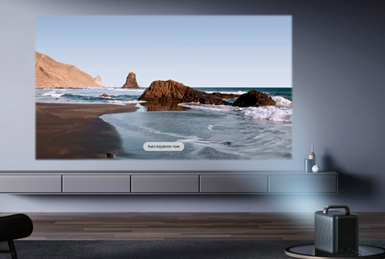As home entertainment technology has
evolved, one of the most significant advancements has been the introduction of
4K resolution, which provides four times the detail of traditional 1080p
displays. This leap in visual quality has led many consumers to consider
whether a 4K projector or a 4K TV best suits their needs. Both options offer
unique advantages and disadvantages, making it essential to understand their
differences to make an informed decision.
Differences
between 4k Projectors and TVs
Display
Technology
The first and most obvious difference
between 4K projectors and TVs lies in their display technologies. 4K projectors
use a lens to project images onto a screen or wall. They can create massive
screen sizes, often exceeding 100 inches diagonally, turning any room into a
mini-theater. Projectors typically rely on various technologies, such as DLP
(Digital Light Processing) or LCoS (Liquid Crystal on Silicon), to render
images. 4K TVs, on the other hand, utilize different panel technologies, such
as LED, OLED, or QLED. These TVs offer bright, vibrant colors and superior
contrast ratios, particularly with OLED models that provide deep blacks and
excellent viewing angles. The display is self-contained, meaning there's no
need for a separate screen or complex setup.
Picture Quality
and Brightness
When it comes to picture quality, both 4K
projectors and TVs deliver impressive visuals, but they do so in different
ways. Brightness is a crucial factor for both technologies. Projectors
typically have lower brightness levels, measured in lumens, compared to TVs.For
example, the Nebula Cosmos 4K SE had 2000 lumens. This means that projectors perform best in darker
environments where ambient light is minimal. A bright room can wash out the
projected image, leading to a disappointing viewing experience. Many high-end
projectors offer HDR (High Dynamic Range) support, enhancing color and
contrast, but they still require appropriate lighting conditions for optimal
results. In contrast, 4K TVs are designed to perform well in a variety of
lighting conditions. They can achieve higher brightness levels, making them
suitable for daytime viewing or brightly lit rooms. This versatility means that
whether it's a sunny afternoon or a cozy movie night, TVs provide consistently
excellent image quality.

Screen Size and
Viewing Distance
One of the most significant differences
between projectors and TVs is the screen size. 4k projectors
excel in creating large images, often between 100 to 150 inches, which can
provide a more immersive cinematic experience. This size advantage makes them
ideal for dedicated home theaters or large viewing spaces. However, achieving
this larger size requires a suitable distance from the screen, which can limit
placement options in smaller rooms. On the other hand, 4K TVs offer a range of
sizes, typically from 43 inches up to 85 inches or more. While they may not
reach the same dimensions as projectors, they are better suited for smaller
spaces. TVs also allow for closer viewing distances without compromising
picture quality, making them versatile for various room configurations.

Sound Quality
Sound quality is another area where
projectors and TVs differ significantly. Most 4K TVs come equipped with
built-in speakers that provide decent audio quality, although audiophiles often
recommend external sound systems for enhanced experiences. Features like Dolby
Atmos and DTS:X are commonly integrated into many modern TVs. In contrast, 4K
projectors usually do not include robust built-in speakers, as they are
primarily designed for visual output. Users often need to invest in external
sound systems to achieve satisfactory audio quality. Therefore, if audio is a
top priority, additional hardware will be necessary for projectors.
Cost
Considerations
Cost is always an important factor when
making a purchasing decision. Generally, 4K projectors can be more affordable
at larger sizes compared to 4K TVs. However, it's essential to consider the
total cost of ownership, which includes additional expenses for screens, sound
systems, and installation. 4K TVs, while typically more expensive for larger
models, come with integrated features and require less setup. The lower overall
installation and maintenance costs often make TVs a more straightforward choice
for many consumers.
Conclusion
In summary, the choice between a 4K
projector and a TV boils down to personal preferences and viewing environments.
If you desire a large, cinema-like experience and have a suitable space, a 4K
projector may be the ideal option. However, if you prefer versatility,
convenience, and consistently high performance in various lighting conditions,
a 4K TV may be a better fit. Understanding these differences allows you to make
an informed decision that aligns with your viewing habits and preferences,
ensuring an enjoyable home entertainment experience. Whether you opt for a
projector or a TV, both technologies offer stunning 4K visuals that elevate
your viewing pleasure.



